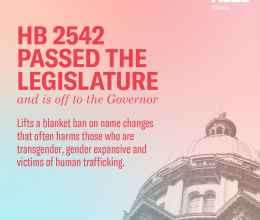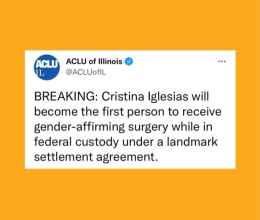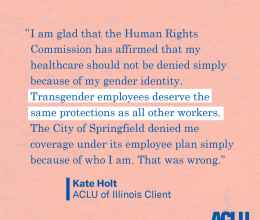
According to a Tribune story posted online today, Lauren Grey is, in all aspects of her life, a woman. Her driver’s license reflects that, as does her name, her Social Security information and her appearance.
Still, her Illinois birth certificate says she’s a man.
She has requested that it be changed and provided a supporting affidavit from the doctor who performed breast augmentation and facial feminization surgeries on her.
But, according to a lawsuit filed on behalf of her and other transgender people this week by the American Civil Liberties Union, the state has denied her request, saying transgender people in Illinois must have “genital reformation surgery” in order to have their birth certificates changed.
“I live as a female, I feel female and everybody treats me that way, but this document doesn’t reflect that,” Grey said. “I know that’s not me, but I can’t do anything about it.”
The class-action lawsuit was filed Tuesday naming Damon Arnold, head of the Illinois Department of Public Health, as the defendant. The suit claims that for years the state would change people’s gender on their birth certificates even if they had not had any form of genital surgery, but that the policy seemed to change “in or about 2005.”
“They’re now saying it has to be genital surgery,” said John Knight, director of the Lesbian, Gay, Bisexual and Transgender Project at the ACLU of Illinois. “We think gender reassignment surgery involves other kinds of surgery, not just genital surgery. The state’s statute leaves it to the doctor to decide what surgeries are required for the gender to be changed.”
Many medical professionals who work with people in the transgender community agree that gender is more a factor of what gender a person identifies with than the person’s anatomy.
In other words, if a person with male genitals lives as a woman and perhaps undergoes some gender reassignment surgeries, that person’s gender is female, regardless of whether the genitals are operated on or not.
“Living in a particular gender is what really determines it, regardless of surgeries,” said Randi Ettner, an Evanston-based clinical and forensic psychologist specializing in gender conditions. “Genitals don’t make a person who they are. We don’t check a person’s genitals before we make a decision of whether we’re talking to a man or a woman.”
Grey, who was a client of Ettner’s, began sex reassignment treatment in 2001, though she says she has identified as a woman since childhood.
“I was a little boy but that’s not how I felt,” Grey said. “As I was growing up, I had to really look at people and understand them so I could figure out how I was supposed to act. I don’t think I figured out about being transgender until I was in high school and I saw it on ‘Oprah,’ and I said, ‘Oh my God, that’s me, that’s what I am.’”
Though she was able to change her name and her gender on her Illinois driver’s license and with the U.S. Social Security Administration, Grey said her requests to change the gender on her birth certificate have been denied. This made it impossible for her to get a passport that identifies her as a female, and also has caused problems with her work as a graphic designer.
She and a business partner applied for Women’s Business Enterprise certification with the federal government, but were denied because Grey’s birth certificate says she is male.
“It’s embarrassing,” Grey said. “It doesn’t represent who I am.”
Ettner said she has had clients who, prior to 2005, were able to get their birth certificate gender changed without having genital surgery. Since then, she said, she has had clients besides Grey who have been denied because genital surgery had not been performed.
“Every individual requires individual treatment,” Ettner said. “A medical requirement that a whole class of people has to adhere to seems so contrary to how medical care should be provided. It’s problematic to make a requirement that everybody needs to follow a certain medical trajectory.”
And, she said, a person’s inability to obtain a birth certificate that accurately reflect that person’s gender identity can cause significant emotional harm.
“A person whose entire life has involved the pain of not feeling whole or authentic, this is sort of the galvanizing document,” Ettner said.




